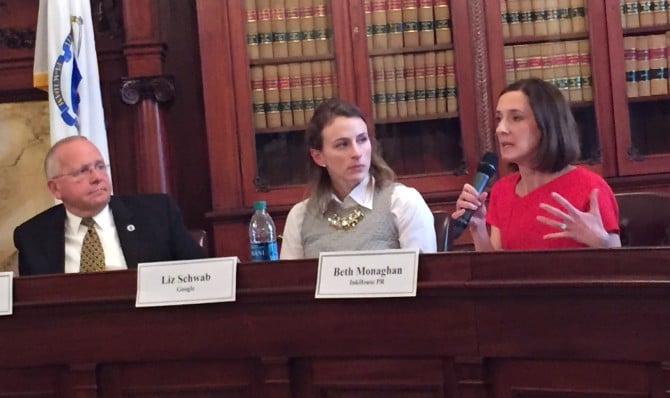Why InkHouse Offers Paid Family Leave
Feb 11, 2016 Beth Monaghan
This morning I joined a panel that included representatives from Google, Spotify and Tamr to present to US Labor Deputy Secretary Christopher Lu. We were there to provide the employer’s perspective about the value of paid family leave as a benefit to our employees. A big thank you to Senator Dan Wolf, Representative John Scibak, Senator Karen Spilka and Representative Ken Gordon for hosting the conversation and for pushing for legislation!
We were asked to answer a few questions about our experiences with paid leave. Here’s a summary of why we think it’s important here at InkHouse, and why we’re working hard to help organizations like The Alliance for Business Leadership (where I sit on the board) and Raise Up Massachusetts advocate for the laws that would bring this benefit to everyone in the Commonwealth.
Why does InkHouse offer paid leave? It’s a matter of humanity. While I was building InkHouse I had two children and struggled through the difficulty of wondering how to manage my maternity leave. I’d been planning to work more than I did on leave, particularly after my second pregnancy. But life had other plans when I ended up in emergency surgery. For weeks after I got home, I was unable to walk from the couch to the kitchen, and I couldn’t even think about work. That’s a story that ends well because I had an amazing team who supported me at work when I was very broken at home. So I have empathy.
Some argue against paid leave because the costs are high. They are. But it’s about more than the hard figures, and by the way, it costs 150% of an employee’s pay to replace her, and a small fraction of that to support her on leave. This makes recruitment and retention major issues. We operate in a knowledge-based economy, which means an employee is worth more than simple manpower, and it’s hard to apply simple financial math to those complexities. This mentality must be reflected in our workplace policies. Working for InkHouse is a two-way street. If we don’t support our employees in their personal lives, how can we expect them to support InkHouse in its professional life?
This is important for our InkHouse community, but it’s important well beyond our two offices and illuminates the issue of women’s equality. I care about this as one of the few female CEOs, but I also care about it because InkHouse’s team is comprised of 84% women. And women carry the burden of care. Policies like paid leave further the broader goal of leveling the playing field for women.
The gender gap is real – from pay, to opportunity for advancement, to board seats – women are on unequal footing. Today women account for just 24 of the Fortune 500 CEOs, and still, women earn just 78 cents to every man’s dollar. And if you’re a woman of color, those figures are far lower. Paid family leave can help shrink the gender gap. It helps keep women in the workforce and reduces the urge to “opt out.”
There is a cultural expectation that women will need to choose between work and family, and those who choose both are often viewed as crazy women who try to “do it all.” And perhaps they are crazy. Perhaps I’m crazy for being an entrepreneur and mother to two girls. Because we’re all essentially signing up for a second fulltime job. That’s not fair, but it’s real.
And yet, if we employed all of the available women in our workforce, we’d increase the US GDP by 5 percent. Men don’t have to answer the question, “Do you think you’ll come back?” when they are about to become fathers. They don’t have to face skepticism about their ability to “do it all.” And until they do, women won’t have equality.
Workplace policies like paid leave can lead to cultural shifts. If we offer paid leave to men and women in equal measure (as we do at InkHouse) – we set the expectation up front that men can and should share in the childcare. Sweden agrees. There, paid family leave for fathers had an impact on their future participation in childcare.
When men help at home, women win at work because they don’t have to bear the burden of care on their own. Then we have more motivated employees because their personal lives are more balanced. I believe this makes people so much better at their jobs. There is living proof that compassionate workplace policies and business success are mutually inclusive. Just think what would be possible if every working mother had that opportunity.

.png)




